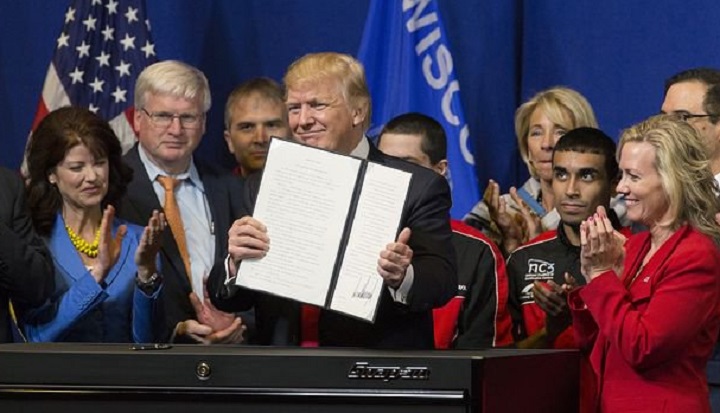Sectors reliant on cheap steel – which includes energy companies, retailers, and American manufacturers – are pressing for political action against President Donald Trump’s wish to impose tariffs on steel imports ahead of a potential decision by the U.S. Commerce Department next week.
In April, Trump instructed a “Section 232” review of the steel sector, a provision in the 1962 Trade Expansion Act which allows for the imposition of tariffs or quotas on imports if they threaten U.S. national security. By doing so Trump is honoring a promise he made in the 2016 presidential election campaign.
As mentioned, the Commerce Department could make a decision as early as next week, which is a decision that three lobbyists say has been delayed as a result of debate inside the Trump administration.
Like most things, there will be those who benefit from the protectionist tariffs, while others will struggle. For instance, steel producers in the United States, such as U.S. Steel Corp (NYSE:$X) and AK Steel (NYSE:$AKS), will benefit from the tariffs on steel imports as it would allow them to raise their prices. However, U.S. manufacturers and energy companies say tariffs could cost jobs in their industries as they tend to use steel to keep their costs down. Additionally, retailers need cheap steel for many aspects of their business, which includes shelving in their stores, and to sell to customers. Furthermore, any United States tariff has the potential to cause damage in unrelated sectors if other countries retaliate and impose tariffs on American exports in industries like agriculture.
“Our member companies have quietly had these conversations with both members of the administration but also with the Hill,” said Hun Quach, the VP for international trade at the Retail Industry Leaders Association.
While some are completely opposed to Trump’s desire, there are those in favor of approving new tariffs, such as steel producers and a few aligned unions.
Advantages and Disadvantages
Mario Longhi, former chief executive of U.S. Steel, said at the start of 2017 that constraining cheap steel imports could help to restore jobs for 10,000 American steel workers.
According to the Commerce Department’s Bureau of Economic analysis, the United States steel sector employed roughly 147,000 people in 2015. But producers that need steel will employ nearly 6.5 million people annually, and the construction sector supports an additional 6.3 million jobs.
In regards to the disadvantages of the new tariffs, manufacturers forecast that increasing the cost of steel by imposing tariffs on imports will hurt American consumers as they will end up paying more for everyday materials that are made from steel, including washing machines, microwaves, and lawn mowers.
It’s not the first time a president has imposed steel tariffs. In fact, when George W. Bush imposed steel tariffs back in 2002, the World Trade Organization found the move to be illegal. This allowed other countries to retaliate against American exports and Bush was then forced to back down. According to studies conducted by the Consuming Industries Trade Action Coalition, 200,000 workers in U.S. manufacturing lost their jobs because of the 2002 steel tariffs.
Lobbying Comes With Political Risk
Seeing as this was a signature piece of Trump’s campaign, opposing the president’s desire will come with a certain amount of political risk. This, for instance, might be why the majority of companies will only discuss their lobbying efforts anonymously.
That said, there have been a number of companies, including Electrolux (STO:$ELUX-B) and National Oilwell Varco Inc. (NYSE:$NOV), who have submitted public comments to the Commerce Department contending against the tariffs. Additionally, there were a few chemical companies who issued forceful comments against the proposed tariffs, as did the American Automotive Policy Council, which includes companies such as Ford Motor Co. (NYSE:$F) and General Motors (TSE:$GMM.U).
“The auto industry and the U.S. workers that the industry employs would be adversely affected and that this unintended negative impact would exceed the benefit provided to the steel industry,” the American Automotive Policy Council stated.
Featured Image: twitter











